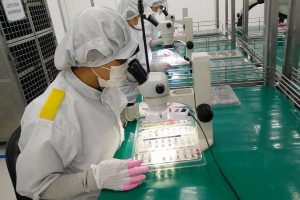TALENT development is deemed crucial in expanding the semiconductor and electronics industry, a trade official said.
Trade Undersecretary Rafaelita M. Aldaba said:
“We cannot overemphasize the importance of this particular element. We need more PhD-level microelectronics and layout engineering competencies, along with R&D (research and development) scientists, to support industries, materials and equipment providers, telecommunications, and logistics.”
“(There is also a) need for us to build a national semiconductor and electronics council, which I believe Vietnam also has, and that’s important in terms of driving the growth and development of the industry in the direction we want it to go,” she added.
She said that the global value chain of semiconductors has six elements, of which the Philippines has a presence in four: integrated circuit (IC) design, assembly, testing and packaging, sub-module subsystem design and assembly, and end products.
“But we don’t have chip manufacturing and wafer-level packaging… So, given these gaps, part of our strategy would really be to shift to semiconductor and electronics design and services with a focus on IC,” she added.
Danilo C. Lachica, president of the Semiconductor and Electronics Industries in the Philippines Foundation, Inc. (SEIPI), said that the government would need to discuss with industry the development of courses that will meet the industry’s needs.
“They need to… understand what the industry needs, and then act expeditiously. Basically, give flexibility to the industry and academia to improve or enhance courses that meet the industry’s needs,” Mr. Lachica said.
He added that the government should have industry experts in their committees to stay up to speed on industry developments.
In terms of the national semiconductor and electronics council, he said SEIPI proposed this to emulate the success in Vietnam and sustain US interest in expanding assembly, testing, and packaging of semiconductors in the Philippines.
“The US is really interested in increasing our assembly, testing, and packaging… and to be able to support that … we need the supply chain; we need to improve our operating costs, power, logistics, and everything. There’s a lot of opportunities to improve,” he added. — Justine Irish D. Tabile
